Spoon was created to be a food network for college students to intelligently discuss and share tips about eating in college. We’ve covered fun topics ranging from from Chipotle hacks to next-level microwave mug recipes. But this week, we’re taking on a more serious note in an attempt to spark conversations about that people aren’t as willing to discuss.
This week is National Eating Disorder Awareness Week. It’s a movement dedicated to raising the level of public understanding of and access to resources about an often stigmatized mental health disease. It’s all about giving a voice to a silent monster—a monster that comes in all sizes and shapes. So we asked you, our readers, to share your raw, honest experiences with eating disorders to show those currently struggling that they aren’t alone.
The responses poured in. We decided to release them, unedited, in three parts to preserve their integrity and sincerity. On Monday, we posted part one. This is part two. You can find part three here.
Here are your stories.
I’ve struggled with food for pretty much as long as I can remember.
It’s come and gone over the years and has manifested itself in different ways—in high school, it started as obsessive working out and restricting what I ate, which turned into binge-eating, which turned into binge-eating and making myself sick afterwards. I stopped doing that after about a year and have never told anyone in my family about it. It will always be in the back of my mind.
Since, I have talked to close friends about it and many of them have experienced the same thing which was, in a weird way, incredibly nice to hear. Not that I would wish this on anyone else, but it was nice to know others have felt the same things as me at one point or another.
I don’t think I can say I’ll ever be 100% happy with the way I look, but I can say that I’m happier than I ever have been and ever was in high school. Don’t be afraid to speak to someone about what you’re feeling!
One of my best friends in high school had an eating disorder.

Photo courtesy of hdwallpaperia.com
I transferred to my high school in junior year, and we became good friends through basketball. I knew she had an eating disorder but I never really experienced it. One time at a basketball game, I looked over at her hands, and there on her arm, she had carved the word “fat.” I prayed it was just Sharpie, but it was a cut. That was my first real experience with an eating disorder.
Later on in the year, she began to open up to me about her eating disorder, and there were times when we’d hang out all day, not eat lunch, and then she’d make me lie to her parents about where we ate. I knew it was wrong, and I knew I didn’t want to lose her, but I wanted to be there for her to rely on. Eventually things got so bad, that one day she just didn’t show up to school. A day turned into a week, which into a month. I texted her but didn’t hear from her until one day she told me she was back at rehab. It was really good for her, but she missed her senior soccer game, prom and graduation.
She’s still kicking it, but it’s not something she’ll overcome any time soon. Though we both went our separate ways after high school, I still think about her and check in with her every now and again. It was hard for me to think about—that I had lied to her parents when she really needed my help, but even now, though we haven’t talked in months, she seems to be back on the right track.
In high school, I was a competitive swimmer, practicing two hours, six days a week.
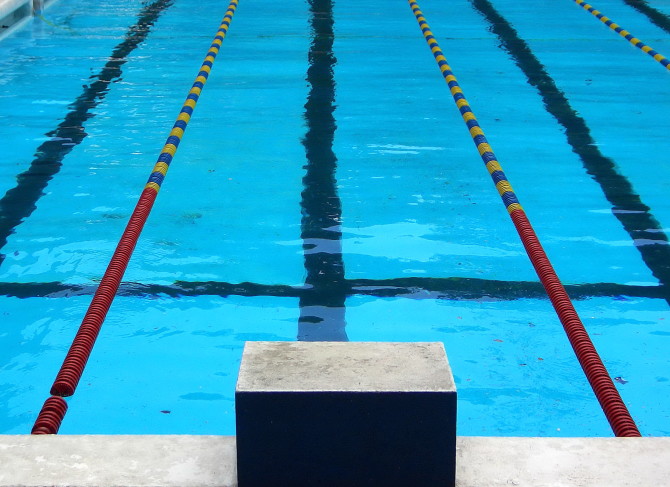
Photo courtesy of Swimming World Magazine
I ate cookies and banana bread and PB&J sandwiches everyday and didn’t really think about what I was putting into my body, because I could really eat anything and not gain an ounce. Up until eleventh grade of high school, I didn’t even know what a calorie was; I ate when I was hungry and stopped when I was content.
But, one day junior year of high school I showed up to swim practice with boba. I remember one of the senior girls looking at me and saying, “You really shouldn’t drink that or you’ll get fat.” That was the first time I had ever really thought about what I ate. After that, I began to notice other girl’s bodies much more.
I realized that, even though I swam a ton, I wasn’t as thin as the other girls; I still had belly fat and jiggly thighs. I started to reduce what I ate, eat more fruits and vegetables and cook my own food. But I became obsessed. By senior year of high school, I had developed bulimia; I would binge-eat one day and feel so bad for the next couple of days that I would eat nothing but fruits and vegetables and exercise like crazy. This mentality lasted a year and a half.
My relationship to food has gotten better, but I still binge eat from time to time. I think it’s important to remember that food fuels use, and is something we need to nurture our bodies. I still have to keep that in mind every time I want to binge-eat.
When I was thirteen, I started high school.

I didn’t have classes with my friends, I didn’t like my teachers and I was sure that I wouldn’t make it out of high school alive. Literally.
During my freshman year, I got into an argument with my parents that turned into hours of yelling while I cried. I went to bed thinking, “My parents really don’t want me. If my own parents that gave life to me couldn’t love me then how could God who gave life to me love me?”
That began many months of a dark depression. In response to the self-hatred I had developed, I began to starve myself. My friends didn’t notice that I never ate at lunch and my parents were oblivious to my small portions at dinner.
During the summer after my freshman year, I had a fling with a guy who was concerned enough with my well-being that he told me I had to tell my parents or he would. I wrote a letter to them explaining my problems and left it on their bed right before I left for a two-week summer camp.
When I got home, they made me go to a therapist. I connected well with her but that wasn’t enough to stop my harmful behaviors. I continued to watch the enemy take my life away from me as my friends cried in front of me, begging me to just eat something.
My parents finally took me to a doctor six months after I had told them I had anorexia. I was officially diagnosed and my doctor looked at me and said, “Your organs are literally shrinking. You could die from this.” That was a shock, but not enough. My parents forgot to schedule follow up appointments and each day I only became sicker.
I went back to the doctor and she brought in my dad and told him I needed the highest level of outpatient treatment available. That began the long journey of recovery. I had no freedom when it came to food. I cried, screamed and wailed. I was filled with anger and sadness.
Within a couple of months, I was weight restored but my recovery was far from over. I was writing suicide letters and saying what I thought were going to be my final goodbyes. Then, one dark night, I was riding in my boyfriend’s pickup truck. He had forgotten to turn his lights on and ran full speed through a stop sign. When he turned, I saw a huge truck flash before my eyes with its horn blaring. As I looked into its lights, I asked God to save me. My boyfriend swerved off the road, barely missing the other truck.
Shortly after, I decided I wanted to graduate early. I spent my last year of high school focused on leaving everything behind me so that I could be in a place where no one knew my past.
I found college to be an amazing place, even though I was only 16 when I started. In the transition from high school to college, I finally began to accept God’s great love for me and his purpose for me. I’m not afraid of my past anymore because God has made something beautiful out of it. I’m not a depressed anorexic cutter with anxiety problems. I am living proof that God can conquer all. The enemy no longer has my life, God does. I am free.
Now, I am on the path to becoming a pediatrician that specializes in eating disorders. There is hope beyond an eating disorder. There is life beyond an eating disorder. There is a world full of beauty beyond an eating disorder. You are so very loved and you are not alone.
–Indiana Wesleyan University
My eating disorder started in response to a painful chronic illness (endometriosis).

I was struggling with my sense of myself as a woman and with the feeling that my body had betrayed me. I started “eating healthy” and exercising to try and take control of my health and body and keep my pain levels in check. Workouts made me feel strong and clean eating made me feel like I had some say in what was going on in my body.
I was always the tall skinny girl growing up, but it didn’t take long on birth control pills for me to hear from everybody how I was sure to gain weight. Everyone had something to say in regards with what was going on with my body and how I shouldn’t be surprised if I lost the slender figure I’d had naturally all my life. I became an exercise zealot, as it was one of the things that helped with the pain, and began to study exercise physiology in college.
By the time I was in my junior year of college, my eating disorder had taken complete control of my life. It ruled how I spent my hours and even leaked into my relationships, driving me to a number of unhealthy and abusive situations with boys that I jumped between in a desperate attempt to feel worthy and actualized.

I have been in recovery for two years after fighting with a friend in an airport (I traveled frequently and recklessly to escape my situation) and being convinced to see a therapist. Since then I have struggled with self-harm and substance abuse culminating in two severe overdoses that I see as my “rock bottom.”
It has not been easy. In fact, it is the absolute hardest thing I can ever imagine going through, living with my ED, depression, anxiety, PTSD, borderline personality and even at times psychosis. However, with what I am learning through this journey and the people I am meeting, I consider this experience to be invaluable. I am now readying to enter graduate school to become an eating disorder therapist and help others with the knowledge and tools built from my experiences and struggles.
–Pittsburgh State University
Everyone has struggles.
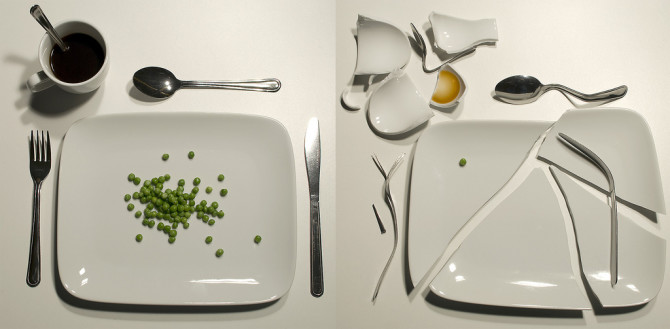
Photo courtesy of Darren Tunnicliff
Read again: everyone has struggles, and no matter how minuscule a problem may seem, every single experience a person goes through becomes an integral part of his identity. For me, this struggle was anorexia.
So let’s go back to the beginning. I am full-fledged Chinese, born in Beijing and raised in Atlanta. As a child, I was always on the smaller side. In fact, my grandparents to this day still remind me about how they had to essentially cook everything down to mush for me or else I would not properly digest and absorb everything I ate and my weight would drop in a matter of days.
Of course, as a child I ate everything that my little heart desired.That being said, however, my family has always eaten a relatively healthy Chinese diet that is largely plant and starch-based with smaller amounts of meat and fish. Fast food, junk food and sweets were rare treats because they were more expensive than rice, vegetables and eggs. Nonetheless, I remember that my favorite food of all time was McDonald’s. Chinese McDonald’s (trust me, there is a difference).
I was about four years old when my family and I immigrated to the USA and I was thrust into a whole different food environment. My mom still made Chinese-style dinners of course, but all of a sudden, I had access to all the things that my body was not used to eating. Now, I don’t mean to say that these foods are particularly fattening, but my body simply was not used to processing the new foods and could not fully comprehend that it has had enough energy, so I gained weight.

I wasn’t terribly big, but compared to my old self and my slim family, I definitely was larger. My mom, trying to be helpful, started trying to limit my portions and make me go out to exercise in an effort to help me lose weight. She did not put me on any sort of intense diet, but just tried to get me to eat a little bit less. This went on and off until I was about twelve.
The summer I turned twelve years old, puberty hit me and it hit hard. All of the sudden, I dropped several pounds and grew several inches with no effort at all. I still ate what I liked, when I liked it, but now my diet incorporated unhealthier fast foods in addition to my Chinese meals. I ate like every normal teenager until about January 2011. At first, it was just a harmless New Year’s resolution to eat a bit healthier and drop a few pounds. I downloaded the infamous MyFitnessPal app and began counting my calories.
I always already a pretty slim girl (even borderline underweight by medical standards), but I just wanted to lose some of my stomach “fat” and get a flat tummy, so I set my first weight goal. I reached it without much effort, but when I got there, I couldn’t see any difference. So I decided to lose more. And that’s when the ball started rolling.
I began cutting my calories out. I began exercising like a lunatic, cycling several hours a day. I stopped eating lunch at school, telling my friends that I would go study in the library instead. I threw away the egg and toast my dad made me for breakfast while he was getting dressed. I skipped dinners by telling my parents that I had already eaten.
And the thinner I got, the fatter I felt.
My parents became alarmed when they realized how much thinner I was. They banned me from exercise and handed me several yogurts and granola bars through the day. So I started walking home from school and hiding food. I made every excuse to eat as little as possible during dinner and hid away in my room immediately after, fearing that they would make me eat again.
My family became a mess. Not a day would go by without some sort of fight about what I ate or my weight. Up to this point, I had never in my life seen my dad cry before, but he cried because of me. My mom was hysterical. I hated myself for doing this to them but I was even more terrified of gaining weight.
From about July 2011 until June 2014, I lived in a state of quasi-recovery. I didn’t gain any weight back (in fact, I lost some more). I was cold all the time. I couldn’t fit into any clothing. My hair was falling out. I didn’t have my period. My boyfriend of over two years and I broke up because I lost all interest in human interactions. To this day, that’s what devastates me the most about this illness: all of the relationships I destroyed.
It wasn’t just my relationship with people, my relationship with God just crumbled. Well, that was exactly how I was living. I was still on my youth group’s praise team, but when I praised Him, I felt nothing. I went on mission trips to the Navajo Nation and Taiwan, but felt little compassion for the people I served and was blind to the work God was doing. In fact, in a twisted way that I am still embarrassed to admit, I used these trips to lose weight: I was on my feet for at least 14 hours a day, running, carrying children and maybe I would eat a granola bar every other day when the hunger pangs became too unbearable. I eventually stopped attending church, stopped reading my Bible, stopped doing daily devotions. I stepped away from God.
If, after reading all this, you still think that being skinny is worth not having that delicious meal your mom made, that nothing tastes as good as skinny feels, and that anorexia is a glamorous lifestyle, then read very carefully: ANOREXIA IS THE MOST EVIL, VILE THING THAT HAS EVER HAPPENED TO ME. It took away every single meaningful thing in my life and left me hating myself more than ever.
I went to college in August 2013 when I should have instead taken a gap year and seek in-patient treatment. Being on my own over ten hours away from home was devastating for my mental health. I began going to the gym at 6AM determined to build up some muscles and become “#strongnotskinny.” I ate nothing but spinach leaves, chicken breast and Quest Bars.
I gave myself a few hundred calories to eat a day, but would never even go near that. Carbs? Totally off limits. All the yummy care packages my mom painstakingly made for me? Out in the trash bin. Medical fact: it is impossible to put on muscle without also putting on some fat. Medical fact #2: it’s impossible to put on muscle while in a caloric deficit. Yes, I knew these two things (I’m a pre-med student) but my disease refused to let me believe it.
It’s safe to say that I spent my first year at college absolutely miserable. My days revolved around the foods I could not eat. I refused to go out and socialize with people. I had no energy to explore my new city. I was not me.
It wasn’t until June 2014 that I decided to take the leap of faith and fully recover for myself. I had followed a few recovery accounts on Instagram for some time and was extremely inspired by a few of the girls. So I started to eat. And eat. And eat. I had a minimum of 3000 calories a day, stayed sedentary, and allowed my body to recover.
This path wasn’t some straight line though, but instead the most convoluted path one can image. Recovery is hard. And it gets harder. There are no days off. There are no “well my body image is too terrible today and I’m too bloated to eat any more so I won’t make my caloric goals.”
But despite how hard recovery was and is, it is still better than being sick and the thing is, you have to recover. There are only two choices when it comes to an eating disorder: either you kill it or it kills you.
So here I am now, heavier, happier and learning to enjoy life again. I’m branching out, trying new things, eating delicious foods (and taking pictures of it for Spoon of course) and teaching myself to love my body.
Even though anorexia was the hardest thing that has ever happened to me and made me miss out on four years of my life, I wouldn’t trade this experience for the world. It’s a hard topic to open up about and most people really don’t understand; eating disorders are not about the weight or the looks—it’s about the control. Going through what I went through has made me infinitely more compassionate about the mental struggles that every single person faces on a daily basis.
I’ve made friends from around the world from this experience and I now run a blog, Tumblr and Instagram account dedicated to helping others in their recovery journeys. I get several emails and Facebook messages daily from people who are struggling to recover, and while it breaks my heart to hear this stories, I am so proud of the strength and progress that all of these people have shown. Trust me, you are not a freak. You are not the only person who is struggling and it’s never too late the recover.
Recovery is hard, but staying sick is even harder.
–Georgetown University
Check out this contributor’s personal blog and recovery site.
I struggled for most of my life.
It started at 6 with binge eating, then became anorexia, then manifested into bulimia and back to anorexia. Twenty years of struggle. In 2011, I finally got help and went into inpatient treatment. Three years of freedom! Now I help others who struggle.
When I was 14 years old, I walked to the park in my town with a friend on a beautiful summer afternoon.

Photo by 7-themes User ZoRDeX
I had known her since I was very young; we’d attended summer camp together, and the school year following that summer I was transferring to her school to begin eighth grade. It was a tumultuous, scary time in my life, as it seems to be for most 14-year-olds. My father had passed away of a neurological condition only three years previously, and as a daddy’s girl I was still reeling. I had moved to a new town, I had a new little brother, and I was generally vulnerable. I cried a lot. It sucked.
When we got to the park, we sat at a bench and were talking, enjoying the day. A boy and his friend came over, both toting skateboards. There was an altercation, probably that we were sitting on their bench or something trivial. All I remember was that it ended with the first boy looking at me and saying, “Whatever. You’re weird. You’re half skinny and half fat.”
At first I didn’t think anything of it. My friend and I laughed off his words. She assured me there was nothing wrong with me. But as I sit here now typing this, I can see his face sneering down at me, pale and topped with yellow-blonde hair, not knowing what he’d set in motion.
I started really looking at myself in the mirror. I stripped down to my underwear before I got in the shower and pinched all the areas on my body that looked “weird.” How can a person be half skinny and half fat? My calves were small, but I had a pocket of fat on my stomach, not the good kind of curves, the kind that make you look like a box. I could see my collarbones but why could I pinch so much skin underneath my arms? Then I would climb in the shower, sit down, and cry.
I decided I wanted to look good for my first day of school. I started waking up early and running. I hate running. I looked up workouts I could do sitting in my bedroom with the music blasting—there was no gym in my town and at 14 I couldn’t easily get to one. Then, slowly and without me realizing it at first, I started restricting. After running in the morning I felt so good that why would I ruin it with breakfast? I’d wait until lunch to eat. And then by the time lunch came around, I just wasn’t hungry.
I never blamed my mom for not noticing; a single parent working to keep up ahead, with an adolescent daughter and a young son. Whatever I did eat for dinner, I wrote in a notebook and looked up exactly how many calories I was consuming. I became obsessed with food. But it wasn’t enough, and no one could know I was half skinny and half fat. I wore t-shirts and loose jeans that had previously been quite tight. I was always tired. I cried in class a lot.
There is no great climax to the story. I was never admitted to the hospital, I never had my family hold my hand in tears and tell me how much they loved me and how sorry they were that they had never noticed me slowly dwindling. Slowly, I gained friends who, without realizing it, helped me understand my self-worth. When we got tests back they checked against mine for answers and I realized the power of my mind.
When we had sleepovers they didn’t mention the way my ribs stuck out against my tank top, but we played American Idol and they told me I had a good voice. I tried out for the cheerleading squad and made it (even though everyone did). Slowly, over years, I pieced together an identity that didn’t revolve around food. I met a boy. I’m still in love with him to this day, a 19-year-old college student.
I have traveled and seen incredible places and eaten amazing food, something that 14-year old-me would have missed out on dearly, would have been too tired to travel in the first place. I still struggle. It’s not a battle that ever goes away; it’s still there in the back of my mind, telling me I’m not good enough, accompanied by that sneering face repeating half skinny, half fat, half skinny, half fat. But I forgive even him his misguided insults—he didn’t know how much damage his words would do, how close I was already to a precipice I didn’t even see coming.
This is my story. It is not dramatic, it is not glamorous. Sadly it is not all that rare. There is no finite ending to anorexia, but you can take away the power it holds over you.
–Miami University of Ohio
I am a 32-year-old women recovering from anorexia.
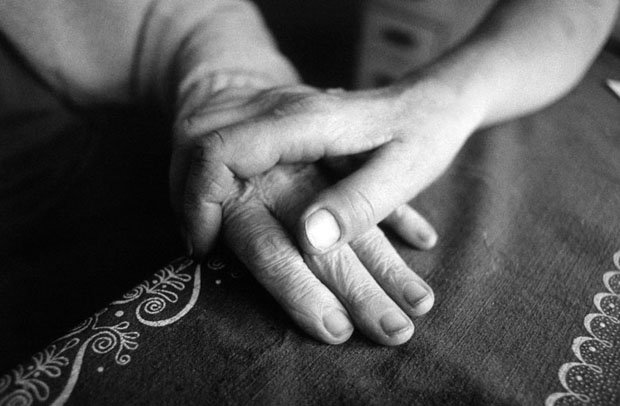
Photo courtesy of Standa Krupar Photography
I have been working hard at my recovery for over ten years, with five inpatient hospitalizations, countless admissions for medical reasons and years of outpatient therapy. I always struggled with my weight and dieting as well as never having a sense of self-worth. Although when my eating disorder really started, I was planning my wedding and just wanted to lose a few pounds.
This quickly spiraled out of control. This was the start to many years of self-growth and challenges. At my worst last year, I was receiving IV therapy at home just to stay alive while I awaiting treatment and surgery. I was a part of a study and had deep brain stimulation done for treatment-resistant anorexia and went to a five-month-long program in a hospital.
Today I still struggle, although overall I am in a place I never imagined I would be! I am happy and healthy. I am now a mother, wife, friend, daughter and everything I want to be.
Thank you.
The thing is, there is this idea floating around (at least in my opinion) that eating disorders are, at least on some level, intentional.

One day a person decides to start purging after meals, or just suddenly gives up eating. While I’m sure that happens, it isn’t always the case. It can also creep up on you, like it did me. Although I never had to battle severe anorexia or bulimia (thank goodness), I did start having some symptoms of both that were alarming in hindsight.
For one thing, the obsessive need to work off excessive calories. There was no one day when I decided to try to purge in any way. It started slowly. If I ate something unhealthy, I might go for a walk later. Then I started measuring the walks. Then I started prolonging the walks to ensure that I had burned off every extra calorie above my normal intake.
There was a night when I went to a party, ate very reasonably, then came home feeling so guilty that I walked ten miles before bed. It sounds crazy, I know, but I have always been a perfectionist, and my brain told me I was being healthy; that I was taking care of myself. Not everyone realizes that over-exercising is another way of purging.
I still had binges on occasion, but they weren’t nearly as severe and I always ran straight to the treadmill IMMEDIATELY afterward to burn off every last red calorie. I justified it by saying that it kept me from eating more (which was true), but there were nights where I stayed up late into the night trying to compensate for “overeating.”
I put “overeating” into quotes because that’s another thing about my junior year of high school: I wasn’t eating enough. If you asked me or any of my friends, we’d all answer confidently that I was the healthiest I had been in my life. I was skinny, I exercised every day, and I ate incredibly healthy. The problem was most days I was eating very little and running/walking every day.
Between school and play practice it felt fine. I didn’t feel like I was starving myself. In fact I was always nibbling on something. Whether I was munching on carrots or chewing gum, I was generally content. Plus, the fact that I ate the same thing every day was a comfort to me. I was confident in the foods I ate and they gave me energy to get through the day.
Really the only indication of trouble was how my moods had changed. I was still goofy and funny often, but my mood would flip like a light switch and I would suddenly be self-conscious and hostile. My sister once mentioned that she missed “fat” me because she was nicer and funnier. It wasn’t the weight though. It was my brain. I was starting to get too obsessed, and too afraid of gaining the weight back.
My senior year was when the binge-eating came back with a vengeance. I had suspected I had it during my junior year, but I really believed I had a handle on it. I was skinny, so how could I have binge-eating disorder? Well, like I said, it came back. I rapidly gained oodles of weight, and began to exhibit pretty clear signs of depression.
The thing was, though, I was really happy. I got into my dream school, loved my classes and made the most amazing friends. I couldn’t reconcile my good fortune with my sudden lack of motivation and self-control. The bingeing became a daily occurrence and my self-esteem plummeted. I never wanted to go out, meet people or audition for shows because I felt so bad about how I looked and felt.
I ached with the weight that I had put on far too rapidly to be safe, and was terrified that it wouldn’t end or that I would get diabetes before I could get myself under control. I was also paranoid that, if I mentioned it to people too often, they would get sick of hearing about it and leave me (you may remember long bouts of radio silence. Yes, that’s right. I thought that even you would get sick of my stupid struggles).
Now I’m not telling you ANY of this to make you feel bad for me, or anything like that. I’m telling you because eating disorders aren’t always as cut-and-dry as they seem in the movies and on TV. I thought I was being healthy by over-exercising. I thought I was just unhealthy when I binged and hid what I ate. I was aware of the disorders and their symptoms, but I didn’t think they applied to me because I read nutrition labels and books and exercised regularly.
Even now, food scares me. I thought I was being healthy when I was under-eating, so the prospect of dieting terrifies me. I don’t want to fall into the same trap of just shooting for as few calories as possible, but even with medicine my brain really wants that game plan to make sense.
This is just a message to everyone to be aware of your habits and be aware of the symptoms. A lot of disorders set in slowly, and it’s nice to head them off at the pass if you can.
–Northwestern University
My freshman year, I was on the varsity swim team.
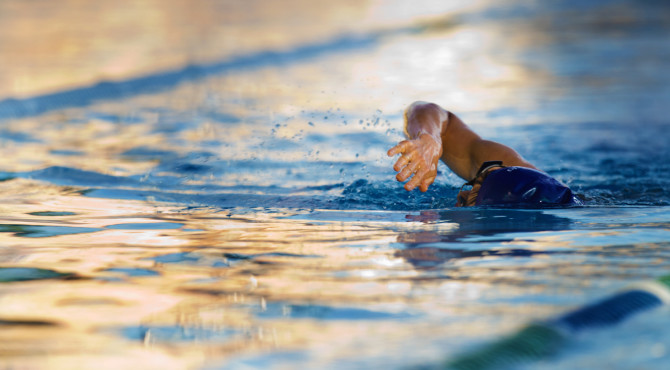
Photo courtesy of Lucas Wroe Photo + Digital Media
A coach told me I wanted to lose weight if I wanted to go on and swim well at NCAAs. What started out as what I thought of as a healthy diet developed into a severe eating disorder. At first I got lots of compliments from my friends and others. The weight came off so easily at first and I became addicted to losing weight. After not seeing results from the hard work I put into swimming, I was finally seeing reward for my efforts in weight loss.
I started restricting my food more and more. I was training all day at altitude over the summer and not eating enough.
After losing a lot of weight, I was so weak I couldn’t swim even close to the way I used to. I was so cold in the water and miserable both in and out of practice. I ended up quitting, but the problems didn’t end there.
I was diagnosed with bradycardia. My heart would only beat an average of thirty times per minute. The doctor was worried that my heart would suddenly stop. He wanted to admit me to an inpatient anorexia clinic, but I decided to fly home instead.
While I was home, I was so scared and depressed I binge-ate almost every day until I had gained back all the weight I had lost. I was so scared of what people would say about my sudden weight gain when I came back to school.
This is something I still struggle with, though overall, things have gotten better with counseling and involvement in the Christian Fellowship at my school.
The standard of beauty is set so high for girls and many of us put our value in how others think we look. This is a huge problem in our culture.
We need to realize how much more we are than the way we look.
I’ve had “issues” with food since I was in fourth grade.

I first binged by sneaking Chips Ahoy cookies up to my room and eating multiple sleeves in one sitting, then feeling so sick I couldn’t move. I would force myself to get up and run four miles. As a 9-year-old.
In seventh grade, I got sick of being the chubby girl and started dieting. And one day, all of sudden I was beautiful. I’d “magically” lost all my baby fat according to my friends. Yeah, magic.
For ninth grade, I went to a new high school and was actually fought over by boys as to who would get to ask me to homecoming. This was such a new concept to me—feeling wanted—that I knew I couldn’t let it go. I continued to drastically restrict my food intake, run multiple times a day and go to lacrosse and soccer practice. I felt powerfully in control. Until the holidays.
I always loved food—cooking, baking and eating it. So the holidays were a time of celebration. But with my new habits, it was a source of anxiety and shame as I binged on all things sweet and chocolate as compensation for the months I had deprived myself. I gained all the weight back until the summer. This cycle continued—losing weight over the summer, gaining it all back by January. I connected the number on the scale with my self-worth as a friend, daughter and girlfriend.
I never saw it as a problem until this summer. After I got back from studying abroad in France and had my now ex-boyfriend coming to visit me in a few days time, I felt I needed to purge myself of all the gelato and cheese I had eaten. I resorted to laxatives—many of them, all at once, and often. I felt sick and disgusting all the time and saw no change in my body. I was ashamed that that was all I could do, that I was too “weak” and “undisciplined” to lose weight naturally.
This year is the worst I’ve felt. I’ve gained weight. Starting my sophomore year of college, I continued to use laxatives and after one night of too much to eat and drink, I tried to throw up for the millionth time. But this time was different. For the first time, I succeeded. Though I’ve stopped with the laxatives, I’ve continued this habit on a sporadic basis.
It saddens me to know that someone who champions health so much has resorted to such painful and unhealthy activities but I can’t stop.
–Georgetown University
My whole life I have been active in sports, and pretty fit.
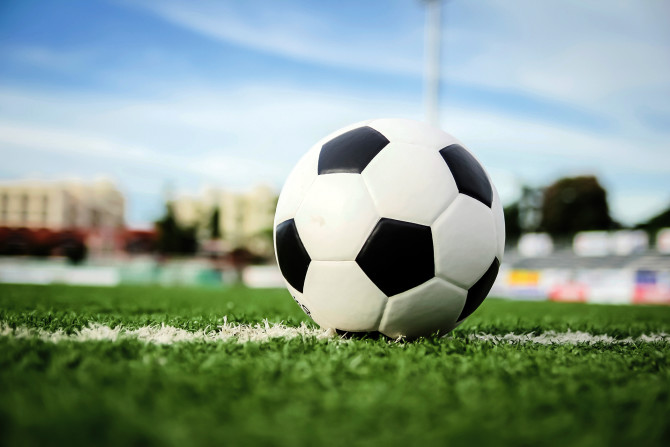
Photo courtesy of sfexaminer.com
I remember, in sixth grade, boys complimenting me on my “six-pack” which I obviously didn’t even care about at the time. Even through junior high and high school, I was perfectly happy with my body.
It started my junior year when I decided to try out being a vegetarian (for ethical, animal reasons. I had done some research and suddenly meat wasn’t appealing to me at all). I didn’t make any changes to my diet except cutting out meat. I still ate eggs and cheese and drank milk. At the time, soccer conditioning for my high school team was starting up. Apparently, I rapidly lost weight because I didn’t even think about my protein intake.
Since I was unknowingly not eating enough protein, but still doing extreme cardio and workouts (my coach was crazy), I actually lost some muscle mass. When we would shower after practices, everyone would tell me, “You look anorexic. Can you eat a hamburger and cake or something? That doesn’t even look healthy. You’re like a skeleton.” The thing is, I ate like a caveman! I have the biggest sweet tooth! I NEVER let myself go hungry, and I was one of those people that needed to have a snack like every two hours!
Because everyone was telling me I looked so gross, and my boyfriend told me that I was a “bag of bones,” I grew so self-conscious. I started looking up “foods that make you fat fast” and “how to get your big butt back.” I would eat until I felt like I would throw up. I ate so many foods that were bad, unhealthy, not nutritious at all. Before soccer practice, I would force myself to eat.
I was desperate to get my old body back, and for people to stop staring at me when I walked down the hallways, telling me how skinny I was. It’s not like that was my intention at all when I decided to go vegetarian. Fast forward two years later, and now I am struggling with binge-eating.
I got into such a bad habit that I am still doing the same things, stuffing myself before I go to bed, but now I go to bed feeling ashamed and embarrassed. I will only do it if no one is around, and I am constantly paranoid of getting caught. There have been times when I tried to make myself throw up.
From my lowest weight when I began binging, until now, I have gained so much weight. I am so disgusted with myself, and now I constantly wish I had my skinnier body back. I will binge for three days straight, and then try not to eat for the next three days. It’s a horrible, vicious cycle and I am desperate to get out of it.
When I’m running on the treadmill, all I can think is, “Remember how many cookies you stuffed down your throat last night….You need to run more.” My point is, people should be less judgmental on one another’s body. Not every skinny person is happy, and not every heavier person is unhappy.
People do not realize the strength of their words. I know none of my teammates meant to hurt my feelings, but I would actually cry myself to sleep when they would tell me all these things. Our society has so much self-hate, and commenting on one another’s bodies doesn’t help the situation. Instead of recognizing people’s physical features, try to focus on their inner characteristics.
I suffered from orthorexia.
This is an eating disorder where you only eat very healthy foods (free from fat, oils, basically anything that would make you gain weight). I was diagnosed with my eating disorder after I lost weight on Weight Watchers during my sophomore year of college. I loved the attention I was getting, so I purposely kept losing weight even after I stopped the Weight Watchers program.
I knew I needed help when food literally consumed my thoughts. I couldn’t focus in class because all my brain energy was being spent on planning out my next meal. If I missed a day at the gym it was the end of the world. I stopped going out with my friends because I thought drinking would just be empty calories. This isolated me and threatened a ton of my friendships. I developed anxiety due to being so scared of situations that would threaten my eating disorder.
It had literally taken over my life. I wasn’t me anymore. I was my eating disorder. With the help of a therapist and a nutritionist, I reached a healthy weight that I’m working hard to maintain now. I learned to cook, which helped me appreciate food instead of fear it. I used my creativity to come up with recipes that included some of my “feared foods” so that eating them again wasn’t so uncomfortable.
My love for food can sometimes carry me away now, which leads to binge-eating, another form of the disorder. Being a part of the food world introduces you to so many new types of delicious food that part of me wants to eat it all, all at one time.
I am much, much better than I am before, and now that I don’t let food control my life, I am happier and less depressed than I’ve ever been. I still have my fat days, days I look in the mirror and think to myself, “how could I let myself eat that pizza last night?” But then I remember that the price I’m paying in return is my life, my friends, my happiness, my health.
Food cannot control me, whether it is a binge or restricting.
You’d think you’d see it coming.
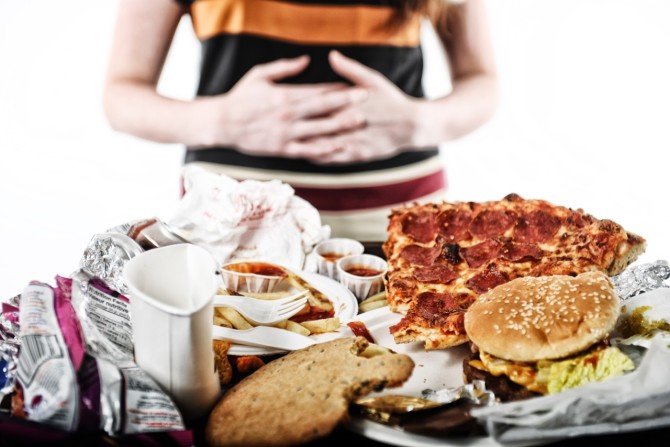
Photo courtesy of Medical Xpress
But it kind of starts happening gradually, and before you know it you’ve got an eating disorder. I’ve been struggling with binge-eating disorder, which I didn’t realize I had until I almost threw up after eating half of my pantry. I was educated a lot in anorexia and bulimia, so I was prepared to keep myself from really starving myself and especially from throwing up my food when I binged.
But binge-eating is a whole separate thing entirely, and most people don’t realize it’s just as mentally and physically harmful as the other two. It’s also much sneakier because so many people talk about shoving their faces with food after a rough day, but eventually it gets to a point where you never stop and you don’t understand how to stop it. It gets to the point where you don’t know what real hunger is and what fullness feels like.
Some people find it emotionally-related, but a lot of people actually find it happening naturally after a diet or an attempt to lose weight fast. The body is so used to starving itself that when you let it go a little, your body starts to make up for all the time spent losing the weight. Both sort of combined for me personally, as I started to find a crippling joy in not caring about my diet and a sick comfort in just eating nonstop.
I think the most important thing is to know you’re not alone, and you should reach out for help when you realize your relationship with food has become distressing. It could be anorexia or bulimia, but it could also be lesser-known disorders like binge-eating or orthorexia. Our relationships with food have become so distorted by the media and our peers that it’s tough to just eat “normally.”
It’s really, really hard to just say it out loud to another human, but when you do, it all changes, because someone else knows and wants you to get better too. You’re not alone anymore and things start changing.
–Drexel University


